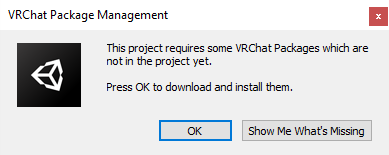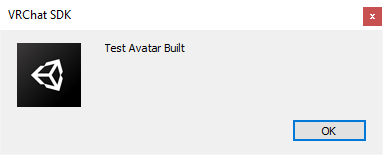Ecosyste.ms: Awesome
An open API service indexing awesome lists of open source software.
https://github.com/vrchat-community/template-avatar
Starter Project for Making a VRChat Avatar
https://github.com/vrchat-community/template-avatar
Last synced: about 2 months ago
JSON representation
Starter Project for Making a VRChat Avatar
- Host: GitHub
- URL: https://github.com/vrchat-community/template-avatar
- Owner: vrchat-community
- License: other
- Created: 2022-08-18T17:05:12.000Z (over 2 years ago)
- Default Branch: main
- Last Pushed: 2024-09-16T19:05:33.000Z (4 months ago)
- Last Synced: 2024-09-17T00:09:10.607Z (4 months ago)
- Language: C#
- Size: 258 KB
- Stars: 31
- Watchers: 10
- Forks: 4
- Open Issues: 1
-
Metadata Files:
- Readme: Readme.md
- License: license.txt
Awesome Lists containing this project
README
# VRChat Avatar Project Template
This repo makes it easy to start a new VRChat Avatar project!
## I Wanna Go Fast
If you don't care about using source control and just want to make something quick:
1. [Download this Zip](https://github.com/vrchat-community/template-avatar/archive/refs/heads/main.zip) and unpack it somewhere.
2. Go to "3. Open the Project" below.
## I Want To Use Source Control
This template is set up to easily make your own GitHub projects, and we highly recommend you take this route.
## 1. Make Your Own GitHub Project
Press [](https://github.com/vrchat-community/template-avatar/generate)
to start a new GitHub project, and follow the directions there. This is an optional step but gets you started with using GitHub for source control so you'll always have a backup.
## 2. Clone or Download the Project
If you're not ready to use git yet, you can download a zip of your project by pressing the "Code" button and then "Download Zip".
If you're familiar with git, use your favorite client or the command line to clone your repository.
## 3. Open the Project
Use Unity 2022.3.22f1 to open the project. Press "OK" on the dialog that offers to download the required VRChat packages.

## 4. Load the Example Avatar
Find the "VRChat SDK" item in the menu bar at the top of the Unity Editor window, press it to open, then choose "Samples > Avatar Dynamics Robot Avatar".

Once the scene opens, choose "File > Save As..." and give the scene a new name.
Then modify the avatar however you'd like - you can [read all about our Avatars 3.0 System here](https://docs.vrchat.com/docs/avatars-30).
## 5. Test Your Avatar
When you're ready to try out your Avatar, find and choose the menu item "VRChat SDK > Show Control Panel".
* Sign into your VRChat Account in the "Authentication" tab.
* Switch to the "Builder" tab and choose "Build & Test".
* After a quick build process, you should see a popup with the message "Test Avatar Built".

* Launch VRChat, open your Avatars menu (click on "Avatars" in your Quick Menu) and look in the "Other" section. Your test avatar will have a temporary name based on the name of the GameObject with the VRC Avatar Descriptor on it. The default name will be "SDK: Tutorial_Robot_Avatar_Dynamics_Demo_v1".
* Select your Test Avatar and press "Test This Avatar" on the left-hand side of your menu.
You should now be testing your custom avatar!
## 6. Publish Your Avatar
When you're ready to publish your Avatar so you can use it regularly:
* Return to the VRChat SDK Control Panel in your Unity Project
* Switch to the "Builder" tab and press "Build and Publish for Windows".
* This will build your Avatar and add some publishing options to your Game window.
* Fill out the required fields "Avatar Name", "Description", "Sharing", and check the terms box "the above information is accurate...".
* Press "Upload".
Return to VRChat - your Avatar should now show up under "My Creations" at the top of the Avatar listing. Choose it and enjoy!